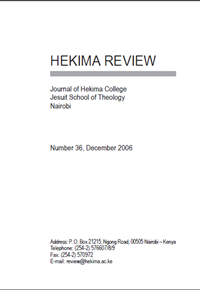The Inequality of Unwritten Languages: Some Reflections on the Christian Use of the Vernacular in Eastern Africa
Keywords:
Unwritten Languages, Vernacular in Eastern AfricaAbstract
For a global cross-cultural religion one of the most significant changes brought about by the Second Vatican Council of the Roman Catholic Church held in Rome 1962-65 was the decision to use vernaculars liturgically and to break away from the previous centrality of Latin. So suddenly vernacular languages became theologically important and their translation a central issue. This raised major issues concerning the translation of religious matters from one major written language into another of more or less equal literate status; Latin, English or German into Mandarin, Hindi, Arabic and Kanji over which expert bilateral translators
have been at work for centuries.
Downloads
Downloads
Published
Issue
Section
License
Copyright (c) 2024 Hekima Review

This work is licensed under a Creative Commons Attribution-ShareAlike 4.0 International License.


